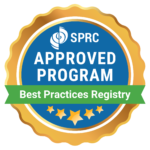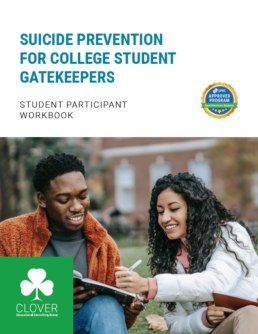Suicide Prevention for College Student (SPCS) GatekeepersTRAINING PROGRAM
 Approved by the Suicide Prevention Resource Center as a Best Practice in Suicide Prevention
Approved by the Suicide Prevention Resource Center as a Best Practice in Suicide Prevention

What is a "Gatekeeper"?
In the context of suicide prevention, a gatekeeper is someone trained to recognize when a peer might be struggling and to take action.
In this program, college students themselves are the gatekeepers—uniquely connected to campus life and in a powerful position to notice when a friend or classmate may be showing warning signs. With the right training, student gatekeepers can offer support, start critical conversations, and guide their peers toward help—sometimes even saving a life.
Program Overview
Suicide Prevention for College Student (SPCS) Gatekeepers is a 90-minute, evidence-based training designed specifically for college students by licensed psychologists at Clover Educational Consulting Group.
This interactive, research-informed program equips students with the knowledge and confidence to recognize signs of suicide risk and encourage peers to seek appropriate help. What sets SPCS apart is its focus on the college student experience—every discussion prompt, example, and role-play activity is tailored to campus life, making the training highly relevant, engaging, and impactful.
The SPCS Gatekeepers program can be delivered virtually or in person, offering flexibility to meet the needs of colleges and universities across diverse settings. Students who complete the training receive a Certificate of Completion, recognizing their role as a trained campus gatekeeper.
Program Structure: Three Phase Learning Model
The SPCS Gatekeepers Program is structured into three interactive phases, each building essential knowledge and skills. Throughout the training, students are actively engaged with discussion prompts, polling questions, and opportunities for reflection.

Phase I
Information Phase
Students are introduced to the foundations of suicide prevention, including:
-
Safe and respectful suicide-related language
-
Statistics relevant to college students
-
Common myths and misconceptions
-
Suicide risk factors and warning signs
Phase II
Skills Phase
Students learn how to:
-
Conduct a basic suicide risk assessment
-
Use a step-by-step decision tree to determine the best course of action
-
Identify and refer peers to local and national mental health resources
Phase III
Practice Phase
Students put their learning into action through:
-
Guided role-play scenarios that simulate real-life conversations
-
Real-time feedback from the program facilitator
-
Confidence-building practice to reinforce skill retention
What Students Are Saying About The Program:
“I felt empowered that I have the ability to help in a crisis.”
Research Support
Ross, S.G., Pazienza, R., Rosa, J. D., & Lipowski (2025). Evaluating the Gatekeeper Training Outcome Package (GTOP). [Manuscript in preparation]. Clover Educational Consulting Group.
Ross, S. G., Pazienza, R., & Rosa, J. D. (2024). The Suicide Prevention for College Students (SPCS) Gatekeepers Program: Comparing in-person and online training outcomes. Journal of American College Health, 1–4.
Ross, S. G., Pazienza, R., & Rosa, J. D. (2024). The Suicide Prevention for College Student (SPCS) gatekeepers program: A 3-year review of the evidence. Crisis: The Journal of Crisis Intervention and Suicide Prevention, 45(1), 41–47.
Ross, S. G., DeHay, T., & Deiling, M. (2021). The suicide prevention for college student gatekeepers program: A pilot study. Crisis: The Journal of Crisis Intervention and Suicide Prevention, 42(1), 48–55.
A Nationally Recognized Best Practice
In 2023, the SPCS Gatekeepers Program was reviewed and accepted into the Suicide Prevention Resource Center’s Best Practices Registry.
It is the only program in the Registry specifically developed for — and backed by evidence for — use with college students, making it a truly unique and trusted resource in campus suicide prevention.
Want to Learn More or Bring this Training to your Campus?
Clover partners with colleges and universities across the country to provide free SPCS Gatekeeper training for their students. Only a limited number of free trainings are offered by Clover each year. Submit the contact form below to inquire.